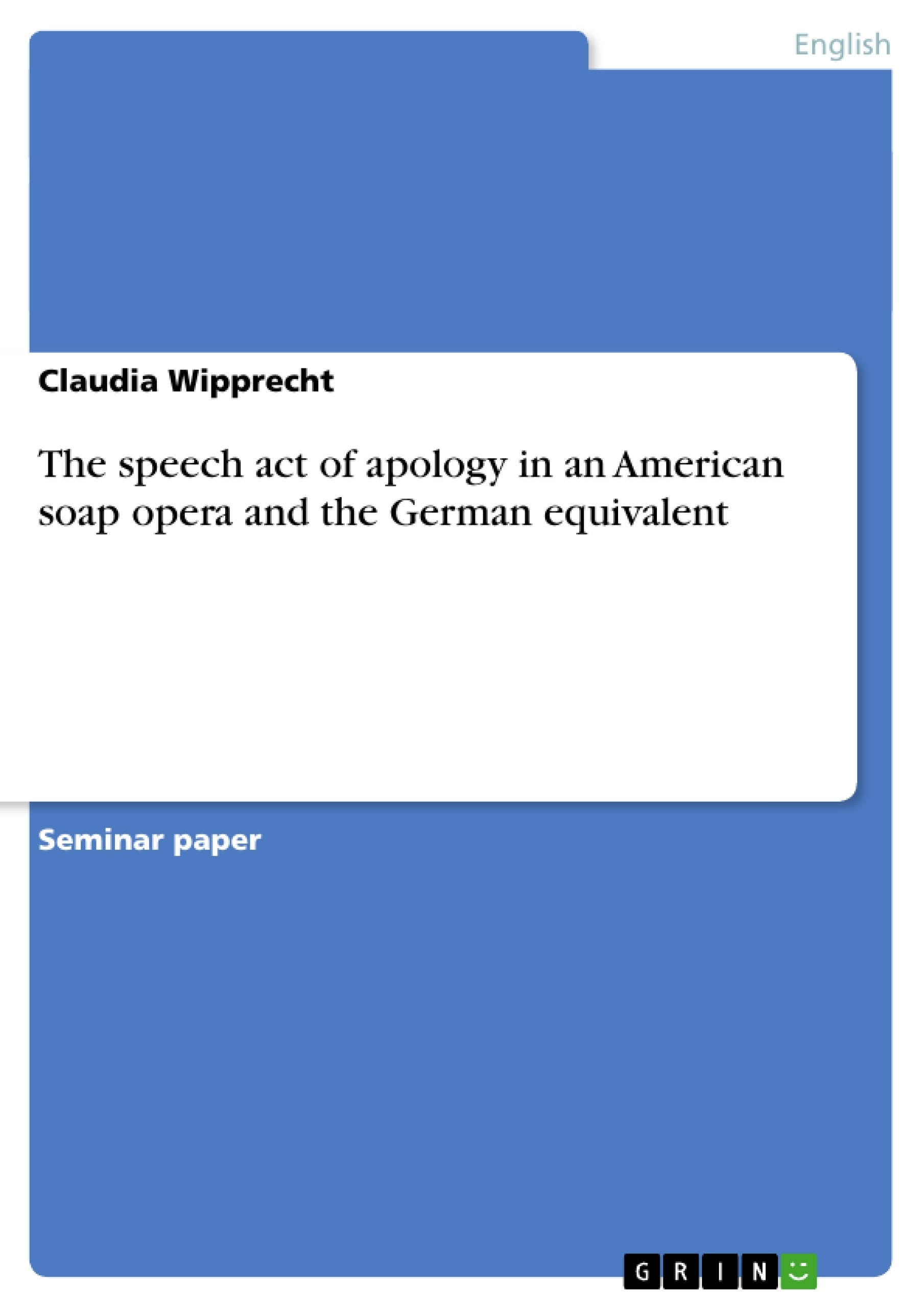Across all languages there are more or less conventionalized linguistic means to be found, e.g. to form a question, make a request, express gratitude or utter an apology. The crucial question is how these conventions look, what kind of language behavior is adequate in a certain situation and if it is understood in the context; these conventions differ interculturally.
The speech act theory, whose pioneer is clearly John Austin (1955 “How to do things with words”), is an adequate approach to gain a deep insight in speech acts like greeting, promising or apologizing. This paper deals with the speech act set of apology. Apologies are clearly performative and expressive. They establish and maintain social contacts. All speakers of a language know certain patterns of speech act sequences, i.e. they know what has to follow after an apology and what is inappropriate. The ability to apply these patterns constitutes a part of communicative competence.
In my paper I will focus on apologies made in an American soap opera, trying to find out the structure of this speech act also considering factors like social relationships and afterwards compare it to the dubbed German version. The aim of this paper is to draw a conclusion on whether cultural factors play a significant role for the translated edition and if the genuine is a prime example for this culture.
Inhaltsverzeichnis (Table of Contents)
- Introduction
- Relevance
- Overview on the speech act of apology
- Apology strategies by Aijmer (1996)
- Explicit Emotional
- Implicit emotional
- Implicit Non-emotional
- Basic data for my analysis
- Method of analysis
- The structure of an apology in the American genuine.........
- Differences in the dubbed German version.
- Conclusion....
- Bibliography:
- Appendix - Transcripts
Zielsetzung und Themenschwerpunkte (Objectives and Key Themes)
This paper analyzes the speech act of apology as it is presented in an American soap opera, examining its structure and comparing it to the dubbed German version. The primary objective is to determine whether cultural factors play a significant role in the translated edition and if the original version reflects typical American cultural norms.
- The speech act of apology as a performative and expressive act in maintaining social contacts.
- The importance of understanding and applying the rules of apology in different cultures.
- The analysis of apology strategies in American soap operas and their potential cultural significance.
- The comparison of the American original version to the dubbed German version to identify cultural differences.
- The examination of the role of cultural factors in shaping apology practices.
Zusammenfassung der Kapitel (Chapter Summaries)
The introduction establishes the focus of the paper on the speech act of apology, highlighting its importance in maintaining social harmony and the need to understand cultural differences in its realization. The paper then provides an overview of the speech act theory, emphasizing its role in understanding how apologies are used to perform actions and express emotions. The chapter further delves into apology strategies, outlining general and situation-specific approaches to apologizing, particularly focusing on the work of Aijmer (1996) and the concept of 'Illocutionary Force Indicating Device' (IFID). This chapter concludes with a discussion of the role of responsibility and context in the choice of apology strategies.
Schlüsselwörter (Keywords)
This paper explores the key themes of speech act theory, apology strategies, cultural differences, intercultural communication, and the analysis of American soap operas as a linguistic corpus. It focuses on specific concepts such as Illocutionary Force Indicating Devices (IFID), emotional and non-emotional apology strategies, and the impact of cultural factors on the realization of apology in translation. The study also sheds light on the importance of considering cultural norms and social contexts in understanding the complex nature of apologies across different languages and cultures.
Frequently Asked Questions
How do apology conventions differ between American and German cultures?
The paper explores how cultural factors influence apology strategies, comparing the original American dialogue of a soap opera with its dubbed German version to identify shifts in linguistic behavior.
What is the "speech act theory" in relation to apologies?
Pioneered by John Austin, this theory views apologies as performative and expressive acts used to establish and maintain social contacts and harmony.
What are the different apology strategies defined by Aijmer?
Aijmer categorizes apologies into three types: Explicit Emotional, Implicit Emotional, and Implicit Non-emotional strategies.
What is an "Illocutionary Force Indicating Device" (IFID)?
An IFID is a linguistic element, like the phrase "I'm sorry," that explicitly signals the speaker's intent to perform the act of apologizing.
Why are soap operas used as data for linguistic analysis?
Soap operas provide a rich corpus of social interactions and emotional conflicts, making them ideal for studying conventionalized speech acts like apologies in a cultural context.
Does the German translation maintain the same cultural nuances as the American original?
The study aims to conclude whether cultural factors play a significant role in the translation and if the dubbed version still reflects the original American cultural norms.
- Citar trabajo
- Claudia Wipprecht (Autor), 2006, The speech act of apology in an American soap opera and the German equivalent , Múnich, GRIN Verlag, https://www.grin.com/document/75512



